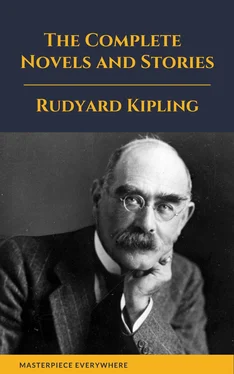Never praise a sister to a sister, in the hope of your compliments reaching the proper ears, and so preparing the way for you later on. Sisters are women first, and sisters afterwards; and you will find that you do yourself harm.
Saumarez knew this when he made up his mind to propose to the elder Miss Copleigh. Saumarez was a strange man, with few merits so far as men could see, though he was popular with women, and carried enough conceit to stock a Viceroy’s Council and leave a little over for the Commander-in-Chief’s Staff. He was a Civilian. Very many women took an interest in Saumarez, perhaps, because his manner to them was offensive. If you hit a pony over the nose at the outset of your acquaintance, he may not love you, but he will take a deep interest in your movements ever afterwards. The elder Miss Copleigh was nice, plump, winning, and pretty. The younger was not so pretty, and, from men disregarding the hint set forth above, her style was repellant [repellent] and unattractive. Both girls had, practically, the same figure, and there was a strong likeness between them in look and voice; though no one could doubt for an instant which was the nicer of the two.
Saumarez made up his mind, as soon as they came into the station from Behar, to marry the elder one. At least, we all made sure that he would, which comes to the same thing. She was two and twenty, and he was thirty-three, with pay and allowances of nearly fourteen hundred rupees a month. So the match, as we arranged it, was in every way a good one. Saumarez was his name, and summary was his nature, as a man once said. Having drafted his Resolution, he formed a Select Committee of One to sit upon it, and resolved to take his time. In our unpleasant slang, the Copleigh girls “hunted in couples.” That is to say, you could do nothing with one without the other. They were very loving sisters; but their mutual affection was sometimes inconvenient. Saumarez held the balance-hair true between them, and none but himself could have said to which side his heart inclined; though every one guessed. He rode with them a good deal and danced with them, but he never succeeded in detaching them from each other for any length of time.
Women said that the two girls kept together through deep mistrust, each fearing that the other would steal a march on her. But that has nothing to do with a man. Saumarez was silent for good or bad, and as businesslikely attentive as he could be, having due regard to his work and his polo. Beyond doubt both girls were fond of him.
As the hot weather drew nearer and Saumarez made no sign, women said that you could see their trouble in the eyes of the girls—that they were looking strained, anxious, and irritable. Men are quite blind in these matters unless they have more of the woman than the man in their composition, in which case it does not matter what they say or think. I maintain it was the hot April days that took the colour out of the Copleigh girls’ cheeks. They should have been sent to the Hills early. No one—man or woman—feels an angel when the hot weather is approaching. The younger sister grew more cynical—not to say acid—in her ways; and the winningness of the elder wore thin. There was more effort in it.
Now the Station wherein all these things happened was, though not a little one, off the line of rail, and suffered through want of attention. There were no gardens, or bands or amusements worth speaking of, and it was nearly a day’s journey to come into Lahore for a dance. People were grateful for small things to interest them.
About the beginning of May, and just before the final exodus of Hill-goers, when the weather was very hot and there were not more than twenty people in the Station, Saumarez gave a moonlight riding-picnic at an old tomb, six miles away, near the bed of the river. It was a “Noah’s Ark” picnic; and there was to be the usual arrangement of quarter-mile intervals between each couple, on account of the dust. Six couples came altogether, including chaperones. Moonlight picnics are useful just at the very end of the season, before all the girls go away to the Hills. They lead to understandings, and should be encouraged by chaperones; especially those whose girls look sweetest in riding habits. I knew a case once. But that is another story. That picnic was called the “Great Pop Picnic,” because every one knew Saumarez would propose then to the eldest Miss Copleigh; and, besides his affair, there was another which might possibly come to happiness. The social atmosphere was heavily charged and wanted clearing.
We met at the parade-ground at ten: the night was fearfully hot. The horses sweated even at walking-pace, but anything was better than sitting still in our own dark houses. When we moved off under the full moon we were four couples, one triplet, and Me. [me.] Saumarez rode with the Copleigh girls, and I loitered at the tail of the procession wondering with whom Saumarez would ride home. Every one was happy and contented; but we all felt that things were going to happen. We rode slowly; and it was nearly midnight before we reached the old tomb, facing the ruined tank, in the decayed gardens where we were going to eat and drink. I was late in coming up; and, before I went in to the garden, I saw that the horizon to the north carried a faint, dun-coloured feather. But no one would have thanked me for spoiling so well-managed an entertainment as this picnic—and a dust-storm, more or less, does no great harm.
We gathered by the tank. Some one had brought out a banjo—which is a most sentimental instrument—and three or four of us sang. You must not laugh at this. Our amusements in out-of-the-way Stations are very few indeed. Then we talked in groups or together, lying under the trees, with the sun-baked roses dropping their petals on our feet, until supper was ready. It was a beautiful supper, as cold and as iced as you could wish; and we stayed long over it.
I had felt that the air was growing hotter and hotter; but nobody seemed to notice it until the moon went out and a burning hot wind began lashing the orange-trees with a sound like the noise of the sea. Before we knew where we were, the dust-storm was on us and everything was roaring, whirling darkness. The supper-table was blown bodily into the tank. We were afraid of staying anywhere near the old tomb for fear it might be blown down. So we felt our way to the orange-trees where the horses were picketed and waited for the storm to blow over. Then the little light that was left vanished, and you could not see your hand before your face. The air was heavy with dust and sand from the bed of the river, that filled boots and pockets and drifted down necks and coated eyebrows and moustaches. It was one of the worst dust-storms of the year. We were all huddled together close to the trembling horses, with the thunder chattering overhead, and the lightning spurting like water from a sluice, all ways at once. There was no danger, of course, unless the horses broke loose. I was standing with my head downwind and my hands over my mouth, hearing the trees thrashing each other. I could not see who was next me till the flashes came. Then I found that I was packed near Saumarez and the eldest Miss Copleigh, with my own horse just in front of me. I recognized the eldest Miss Copleigh, because she had a pagri round her helmet, and the younger had not. All the electricity in the air had gone into my body and I was quivering and tingling from head to foot—exactly as a corn shoots and tingles before rain. It was a grand storm. The wind seemed to be picking up the earth and pitching it to leeward in great heaps; and the heat beat up from the ground like the heat of the Day of Judgment.
The storm lulled slightly after the first half-hour, and I heard a despairing little voice close to my ear, saying to itself, quietly and softly, as if some lost soul were flying about with the wind:—“O my God!” Then the younger Miss Copleigh stumbled into my arms, saying: “Where is my horse? Get my horse. I want to go home. I want to go home. Take me home.”
Читать дальше












